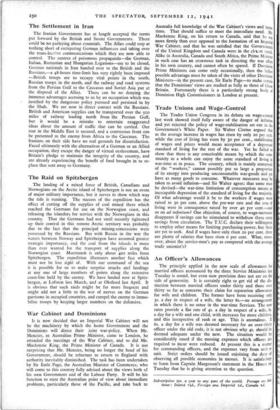The Settlement in Iran
The Iranian Government has at length accepted the terms put forward by the British and Soviet Governments. There could be no parleying about essentials. The Allies could stop at nothing short of extirpating German influences and taking over the trans-iraeian communications which they are now able to control. The centres of poisonous propaganda—the German, Italian, Rumanian and Hungarian Legations—are to be closed, German nationals in Iran handed over to the British and the Russians,—a 48-hours time-limit has very rightly been imposed —British troops are to occupy vital points in the south, Russian troops in the north, and the railway and road systems from the Persian Gulf to the Caucasus and Soviet Asia put at the disposal of the Allies. There can be no denying the immense advantages accruing to us by an occupation which was justified by the dangerous policy pursued and persisted in by the Shah. We are now in direct contact with the Russians. British and American supplies can be transported over the 5430 miles of railway leading north from the Persian Gulf, but it would be a mistake to entertain exaggerated ideas about the amount of traffic that can be carried. Our rear in the Middle East is secured, and a continuous front can be presented to the enemy from Africa to the Caucasus. The Iranians on their side have no real grounds for dissatisfaction. Faced ultimately with the alternatives of a German or an Allied occupation, they escape the danger of virtual enslavement, have Britain's pledge to maintain the integrity of the country, and are already experiencing the benefit of food brought in to re- place that sent away to Germany.


























 Previous page
Previous page